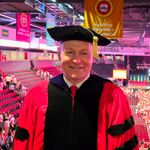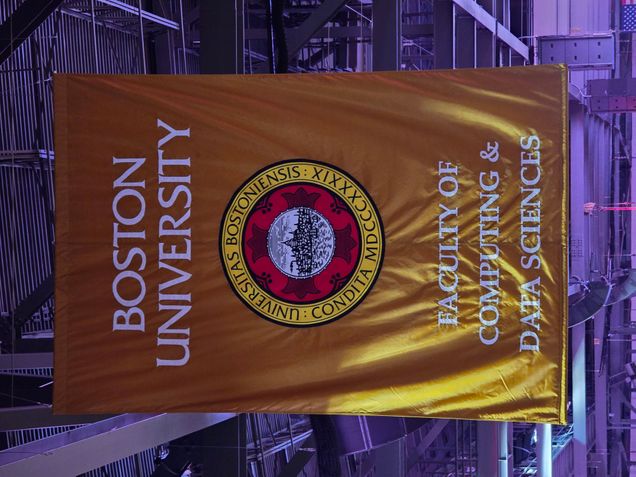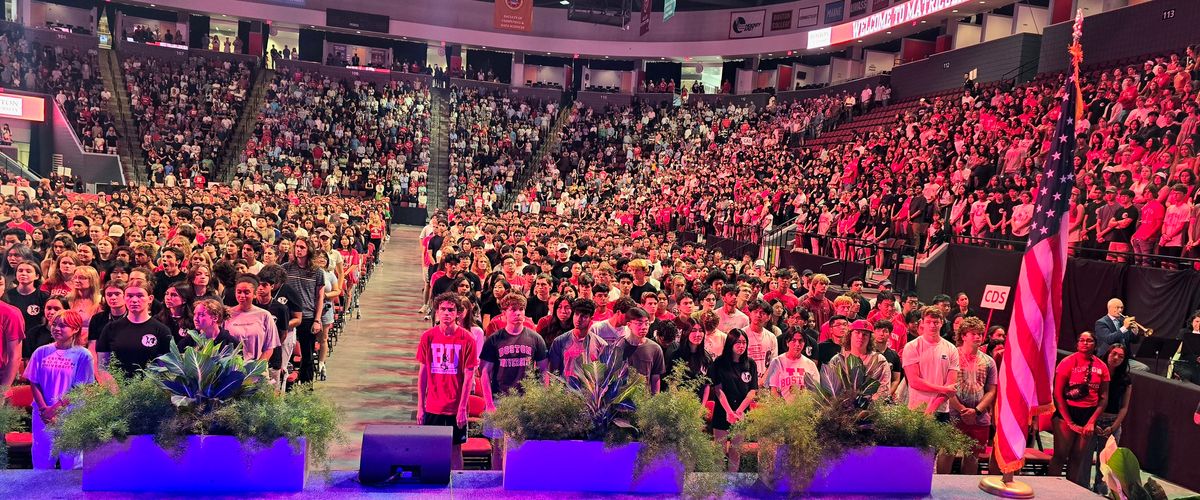Dr. Wesley Wildman Delivers Faculty Address at Undergraduate Matriculation
On Sunday, September 1, 2024, Melissa L. Gilliam, Boston University’s 11th president, welcomed the Class of 2028—over 3,300 students—to the University at a Matriculation ceremony held at Agganis Arena. Dr. Gilliam delivered her first major public address, speaking to new students, their families, and guests.
"Make this experience your own, and don’t be afraid to challenge yourself,” she urged the freshmen, adding later: “Class of 2028: Today is the first day of a great adventure. Have a wonderful time along the way, and take care of each other while you do. Let’s say hello, one Terrier to another, when we see each other on campus and on Comm. Ave. I can’t wait to see all the ways in which you will make a positive impact on our University and on our world.”
On behalf of all BU faculty, Wesley Wildman, Chair of Faculty Affairs for Computing & Data Sciences and Professor of Philosophy, Theology, and Ethics, addressed the incoming class. He offered a "top 10 list of advice for matriculants," including: "Build on your accomplishments," "Be yourself," and "Kiss the moments as they fly by."
"Right now, I see thousands of intricate life tapestries, already interwoven with thousands more, some of whom are your guests today...," he said. "Soon you will be adding new threads to your life tapestry, interweaving with the very people among whom you are sitting."
Wildman also noted the relentless pace of technological innovation and emphasized that the Class of 2028, equipped with their BU education, is uniquely positioned to confront and address these issues.
"Our world is a high-tech, fast-transportation, big-differences-close-together, opportunity-packed, kaleidoscopically shifting miracle of cooperation. And we are in the middle of an epochal shift," he said, adding: "...I know one thing. You can learn to see deeply. You can enhance your powers of compassion, sensing the pain of others and translating that into revolutionary action for the sake of a more just and hopeful future. You can unravel the mysteries of the complex social systems that trap us even as they transform us. You can learn to read the longer-term future. You can be the visionary force of hope that we need as we struggle for an adaptive response to an unprecedented cultural situation."
The following is a transcript of Wesley Wildman’s address to the Class of 2028.
 Congratulations Class of 2028! You’ve come a long way already. You’ve finished one adventure, building a record of accomplishment that got you admitted to a highly competitive university. You survived COVID high school. You’re now probably figuring out how to say goodbye to the people who love you most in the whole world, who have guarded and guided you for many years. Now you’re starting a new adventure right here, at Boston University, a powerhouse institution in a vibrant city. There’s a lot to look back on, and plenty to look forward to. I’m looking forward to getting to know some of you in ethics classes within the Faculty of Computing and Data Sciences.
Congratulations Class of 2028! You’ve come a long way already. You’ve finished one adventure, building a record of accomplishment that got you admitted to a highly competitive university. You survived COVID high school. You’re now probably figuring out how to say goodbye to the people who love you most in the whole world, who have guarded and guided you for many years. Now you’re starting a new adventure right here, at Boston University, a powerhouse institution in a vibrant city. There’s a lot to look back on, and plenty to look forward to. I’m looking forward to getting to know some of you in ethics classes within the Faculty of Computing and Data Sciences.
I commute to work on public transport. Over the years I’ve made some good commuter buddies. Lately, I’ve been asking the parents with kids in college and the young people just out of college what advice they would give you as you approach this new phase of life. I collected the advice into a top-ten list I call “commuter buddy advice for matriculants.”
- Number 10: Build on your accomplishments! Remember what you have already achieved and use that confidence to thrive.
- Number 9: Plan for your future! College is the ultimate life-planning tool so make the most of the freedom you have to choose the life you want.
- Number 8: Make a difference! Volunteering is good for mental health and good for others. Find a transformative activity that’s meaningful to you and invest in it.
- Number 7: Be skeptical! Question everything, including the way universities work, the way politics and the economy work. Don’t assume things need to stay the same.
- Number 6: Be yourself! Listen to what everyone says you should be and do, but then make your own decisions about who you are and what you will become.
- Number 5: Think first! Your frontal-cortex powers of self-regulation are still in development but you’re super-smart so don’t do dumb things.
- Number 4: Grasp opportunities! Stretch out of your comfort zone, try novel activities, make new friends. You get out of college what you put into it.
- Number 3: Build character! Happiness depends on a morally principled approach to life, grounded in a deep sense of compassion and fairness.
- Number 2: One day at a time! It can be a lot – college classes, new roommates and friends, living far from home, staying healthy. Take it all one day at a time.
- Number 1: Kiss the moments as they fly! This is a precious time in your life so don’t take it for granted and allow yourself to relish every moment. Have a blast!
And one final piece of advice: don’t call your parents for everything, and if you fall, get right back up again! As the Japanese proverb says, “fall down seven times, stand up eight.”
The wisdom of my commuter buddies and friends is solid, I reckon, born out of their children going to college and their own experiences as students. I’m betting your wise parents would back their advice.
Advice delivered, let’s move to a more professorial perspective on matriculation since I am charged today with speaking on behalf of my faculty colleagues.
Professors are different in the ways regular people are. We’re also similar in some ways. We’re probably ideologically less diverse than we might be. We all dress up from time to time, with robes and hats and hoods. It might look odd, but we’re reminding ourselves of the vast heritage of knowledge discovery to which each of us contributes in our own unique ways. Another point of commonality is that we love our students – our favorite traits are probably their curiosity, their raw intelligence, their hunger to learn, and their determination to leave the world better than they found it.
 We have something subtler in common, too. Though we’re interested in information and knowledge for its own sake, and we’re committed to passing it on to the next generation, we’re also invested in understanding – by which I mean making meaningful sense of our reality, our cosmos, our planetary habitat, our history, our societies, our behavior, our bodies, and maybe even our future. Those themes are way too large for any one of us to master but, collectively, we deepen a shared understanding. Our university creates an amazing home for this to happen. By admitting you to university, we’re inviting each of you to catch a glimpse of the accumulating knowledge and understanding that we’ve built over the two-and-a-half thousand years since academic scholarship arose, through millions of thinkers and books, leading to countless potentially transformative educational moments.
We have something subtler in common, too. Though we’re interested in information and knowledge for its own sake, and we’re committed to passing it on to the next generation, we’re also invested in understanding – by which I mean making meaningful sense of our reality, our cosmos, our planetary habitat, our history, our societies, our behavior, our bodies, and maybe even our future. Those themes are way too large for any one of us to master but, collectively, we deepen a shared understanding. Our university creates an amazing home for this to happen. By admitting you to university, we’re inviting each of you to catch a glimpse of the accumulating knowledge and understanding that we’ve built over the two-and-a-half thousand years since academic scholarship arose, through millions of thinkers and books, leading to countless potentially transformative educational moments.
Now, let’s be realistic. As weird as we professors are, we’re not stupid. We do know that some of you are here for the fun and freedom of emerging adulthood, some of you want a career-focused education to make big bucks and juice life for everything you can get out of it, and some of you have no idea what you really want yet because you’re just doing the next thing that everyone around you seems to expect.
That’s all fine. But adjacent to your party-school fun, your big-paycheck hunt, and your figure-yourself-out quest lies the deep vision of universities – Boston University included. This vision is active all around us, it is incredibly exciting to us professors, and we’re inviting you to see it for yourself. But it’s a quiet invitation. Nobody’s going to force you to dig deep for that profound understanding. You can get through your degree and rightly celebrate your graduation by accumulating information, honing skills, and passing courses. But just in case your curiosity does extend to wanting to know what we professors consider the good stuff, the deep reason we do what we do, including dressing up in funny clothes for special occasions, indulge me for a moment. I’m going to offer an uncommon perspective on what’s happening right here, with all of you and your families.
I study complex social systems for living. I learned how they work, how they break, how they transition between regimes, using computational, data-science, social-science, and humanities tools. As part of that, I also study how people make meaningful lives, find a moral orientation, and cultivate personal virtues that help to make life so intensely beautiful, using tools from philosophy, ethics, and theology. I love what I do and sometimes can scarcely believe that I can make a living from it. This collection of skills affords an angular way of seeing. I write nonfiction and fiction to express what I see.
Right now, I see thousands of intricate life tapestries, already interwoven with thousands more, some of whom are your guests today, including wise and long-suffering parents. Soon you will be adding new threads to your life tapestry, interweaving with the very people among whom you are sitting. I find the intensity of each individual life almost overwhelming to contemplate. The joy and striving – and yes, even the pain and failure – is staggering. How can any of us truly fathom the intense interiority of another person’s life journey?
But this moment is not just about you as individuals. Today I also see the leading edge of a civilizational transformation. From a cultural-evolutionary perspective, we have NEVER been remotely close to where we are now as a species. We have only the slightest notion of what adaptive responses might be, of what it takes to survive and thrive in the new world we are birthing.
What makes our cultural situation so utterly unprecedented?
Our world is a high-tech, fast-transportation, big-differences-close-together, opportunity-packed, kaleidoscopically shifting miracle of cooperation. And we are in the middle of an epochal shift.
Our species’ first gigantic transformation in civilizational form was from hunter-gatherer lifestyles to farming communities with domesticated crops and animals. It, too, was a miracle of cooperation, but it took a long time to unfold – thousands of years – partly because plenty of people weren’t convinced that noisy, smelly, crowded towns were a great lifestyle choice, even if long-term food storage and coordinated defense solved important survival problems.
The transformation we are going through is mind-bogglingly fast by comparison. The first airplanes flew just a handful of decades ago. Now we can jet from New York to my home in Australia without stopping to refuel. Not long ago, typewriters were incredibly cool, and to see actors telling stories we needed to attend live theater. Spare a thought for your parents who are amazed at what you think is just normal technology. But don’t forget that your children will laugh at your dinosaur ignorance of the tech they take for granted – that’s how fast things are changing.
We are not well adapted to this dazzling complexity and furious pace of change. Our vision penetrates deep enough into complex social systems to anticipate some marketing realities and revenue pathways, but not far enough to see the unintended consequences of our decisions.
We discovered how to extract carbon-based energy to power our civilization, but we didn’t anticipate climate change. By the time we figured out the consequences of our actions, we were economically dug in and now we find it difficult to adjust course.
We created social-media technologies that made a few people extremely wealthy only to discover later that we unintentionally burdened a generation of children with an addictive distraction lifestyle that measurably increases social anxiety and blue-screen loneliness.
We built medical technologies and public health expertise that have doubled lifespans worldwide since 1900 and taken us to the very edge of individualized medical treatments that promise to end cancer and most other diseases on planet Earth. At the same time, this knowledge unleashed formidable biological weapons and brought us ethically puzzling biomedical technologies from cloning to designer babies.
We created artificial intelligence to offload a host of complex, expensive tasks to machines without truly understanding the economic transformation it would trigger. AI algorithms are now everywhere, generative AI is already routine even though still in its infancy, and robotics is launching us into the AI stratosphere. General artificial intelligence is just around the corner, yet we have barely begun to wrap our minds around the unprecedented challenges posed by this new breakthrough in technology.
On top of all that, our cultures have shifted in unprecedented ways. Religion is in rapid decline. For some of you, that’s a reason to grieve and worry, while for others it is a point of celebration or indifference. But all of you should recognize that this takes our species into unfamiliar territory: human beings have never NOT had religion to generate social cohesion through stabilizing social norms and moral values. Meanwhile, spirituality continues in a chaotic way without religious restrictions and guidance. Ethics has become hyper-individualized, politics has become truth-optional, our seemingly heartless institutions are driving many young people to despair, and it is difficult to find corporate support beyond families for cultivating the virtues that make for honorable character and healthy citizenship. When religion began its unprecedented decline two centuries ago, we didn’t anticipate these side effects. And now we know religious decline is not just a Western phenomenon; it occurs worldwide, wherever there is economic security, education, freedom, and cultural pluralism. Our species has never had to manage a civilization under these circumstances, so we have little established wisdom to draw on.
I don’t know what the next exciting tech breakthrough or big cultural shift will be, but I do know one thing: We are not ready for it. We’re not ready because we’re not adapted to the mind-bogglingly rapid pace of change, because we don’t know how to see deeply into complex systems, and because our tech-intensive cultures are exposing our tendencies to cognitive error. Just look at how easy it is to fool us with disinformation.
I know one other thing. You can learn to see deeply. You can enhance your powers of compassion, sensing the pain of others and translating that into revolutionary action for the sake of a more just and hopeful future. You can unravel the mysteries of the complex social systems that trap us even as they transform us. You can learn to read the longer-term future. You can be the visionary force of hope that we need as we struggle for an adaptive response to an unprecedented cultural situation.
The truth is that, in the long run, we need you more than you need us. We faculty are hoping, with our whole hearts, that you’ll invest in learning to see deeply, so that you can show us how to live adaptively. You’ve been invited. Come on in.
Whoever said “home is where the heart is” was not wrong. As we invest in you, invest your heart in this place and make it your home.
My commuter buddies and friends join me in sincerely wishing you every good thing. On behalf of the faculty of Boston University, who are brimming with confidence in you, welcome home, Class of 2028!
